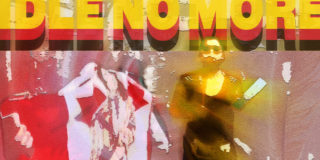Former Kopassus commander Lt. Gen. (ret.) Prabowo Subianto (who was “forced to retire because of his involvement in the kidnapping, torture, and murder of democracy activists in early 1998”) has argued:
Indonesian culture is very violent and the military is a mirror of society. … This whole culture in Indonesia is a culture of violence between tribes and ethnic groups. …This is something that we are aware of, something we do not like, and something that we would like to address, to control, and to manage. But it is there: fighting between families, fighting between villages, fighting between tribes, fighting between ethnic groups, and finally fighting between religions.
(Elizabeth Fuller Collins, ’Indonesia: A Violent Culture?’ Asian Survey 42(4) 2002, p.582.)
The above quote from Lt. Gen. (ret.) Prabowo Subianto is informative on a number of levels as we consider the ‘total war’ currently being waged against the people of Papua by the Indonesian Military Machine, a machine that is funded and trained, in part, by the Australian Military and the Australian Federal police.
When I speak of total war I speak of a war, in Papuan terms, in which the Javanese aggressor is destroying homes and livestock, burning fields and making no distinction between civilians and combatants. What the Javanese are doing right NOW in Papua is reminiscent of the total war the British waged against the Pequot by British Colonists in 1636.
The Pequot war was started by British Colonists in Massachusetts. The colonists attacked the Pequot village at dawn, surrounding it, setting it on fire, and burning alive all the people, predominantly women, elders, and children. Even the Narragansett who were allied with the colonists because of their rivalry with the Pequot’s were shocked by the colonists’ approach and methods and they deeply condemned what they saw as pointless slaughter. Warfare in Native American society was more for pastime than to conquer and subdue enemies and it was rarely used for fulfilling the task of exterminating another race.
Isn’t the conduct of the British colonists in dealing with the Pequot and which so shocked their Narragansett allies exactly what the Javanese are doing in Papua NOW? Let’s consider a recent report from West Papua Media Alerts:
Thousands of people have reportedly fled in terror from a large area in Paniai, West Papua as a massive combined Police and military offensive attacked villages on December 13, attempting to break armed resistance from pro-independence guerrillas.
Credible human rights sources are claiming up to 20 local people have been shot dead by Indonesian security forces around the jungle centre of Markas Eduda, during a brutal operation that is reported to have razed 26 villages, and caused over 10,000 people to flee to the relative safety of Enaratoli.
Over four full strength combat battalions of Indonesian army (TNI) Kostrad commandos from Battalion 753, Brimob paramilitary police, and elite counter-terrorism troops from Detachment 88 – all units armed, trained, and supplied by the Australian Government – were deployed in a cordon to surround the headquarters of the Paniai Free Papua National Liberation Army (TPN-OPM), under the command of General Jhon Yogi.
The Javanese Military machine, using tactics developed by British and Dutch Colonists in North America nearly 400 years ago, are pitting tribe against tribe, blood against blood, in an effort to achieve a military, social and ethnic outcome that in the final analysis will not and cannot be to the benefit of any Papuan’s.
The similarities between the British and Dutch Colonization of North America nearly 400 years ago and what the Javanese are doing in Papua NOW don’t stop there. Let’s consider the role of Squanto in the North American context and compare it to the role being played by Franzalbert Joku and Nicolaus Messet in Papua on behalf of the Javanese, NOW.
Squanto is one of the most famous and well-travelled of the Colonial-era Indian interpreters and guides. Born into the Pawtuxet tribe in the area now occupied by Massachusetts and Rhode Island, Squanto would journey across the Atlantic, be sold into slavery, and serve as an emissary for the Plymouth Colony’s governor before his death in 1622. Thomas Hunt, a member of John Smith’s exploration party, captured Squanto from his tribe, took him across the Atlantic, and sold him into slavery in Spain. Squanto subsequently escaped to England, joined the Newfoundland Company, and returned home in 1619—only to learn that his tribe had been obliterated by disease. Governor William Bradford of the Plymouth Colony then made Squanto, who was fluent in English, his Indian emissary. Squanto was also an interpreter for the Pilgrims during negotiations with the Wampanoag chief.
(“Squanto.” Encyclopædia Britannica. 2004. Encyclopædia Britannica Premium Service.)
High profile West Papuan former independence leaders Franzalbert Joku and Nicolaus Messet are now strident NKRI (Negara Kesatuan Republik Indonesia) advocates. Each extols the virtues of Indonesia’s Special Autonomy Law (claimed by most Papuans to be a spectacular failure) and together they have formed the group IGSSARPRI – the Independent Group Supporting Autonomous Region of Papua in the Republic of Indonesia. This group is active, with Indonesia’s financial backing, in trying to repatriate West Papuan refugees living in Papua New Guinea. Being skilled orators, Joku and Messet are sent by Indonesia as “West Papuan representatives” to international forums such as the September 2010 US Congress Subcommittee hearing in Washington DC, on Crimes Against Humanity: When Will Indonesia’s Military Be Held Accountable for Deliberate and Systematic Abuses in West Papua?, and the University of Sydney’s Comprehending West Papua conference in Sydney during February 2011, to pursue Indonesian ends. At the former forum which was convened for West Papuan activists to present their appeals against Indonesia, Messet professed to represent an “independent and privately funded group [IGSARPRI] dedicated [to] collaborating with all institutions and individuals whoever they may be, including the government of Indonesia, to creating a just, peaceful and prosperous society in the nation of Indonesia, inclusive of Papua”. He then entreated that:
[the] United States House of Representatives and the United States administration under the leadership of President Barack Hussein Obama, as a matter of regional and international strategic priority, reaffirm and strengthen the comprehensive partnership arrangement between the United States and the Republic of Indonesia without further delay.
(Jim Elmslie and Camellia Webb-Gannon with Peter King; Anatomy of an Occupation: The Indonesian Military in West Papua)
What we have in Papua is a situation of history repeating itself. The Javanese are using in Papua the tried and true tactics of their own former colonial masters the Dutch. Divide and conquer in the age struggle of civilization versus indigenous rights. On the point of civilization versus indigenous rights let’s consider for just one moment a poignant moment in the Dutch Colonial experience in North America.
The Dutch in 1626 bought the island of Manhattan from the Canarsies. In New York City, there is a statue to commemorate this purchase of “New Amsterdam.” It is located at South Ferry at the precise spot where the sale did not in fact take place, because the Canarsies were never resident in Manhattan. This story has been propagated forever with the supposed sum of $24 of beads as the selling price. The Dutch, in effect, bought the rights to Manhattan from the Canarsies. The Canarsies, however, lived in what is now known as East Brooklyn. The Canarsies, then, sold something for which they had no claim. The Weckuaesgeeks who actually lived in Manhattan were not pleased at all with this agreement and warred sporadically with the Dutch for years until about 1644 when, probably with the help of the Canarsies, the Dutch exterminated the Weckuaesgeeks.
After deliberately purchasing the island of Manhattan from the ‘wrong’ tribe, the Dutch then proceeded to pitch tribe against tribe to further Dutch colonial interests and as history has clearly shown Dutch colonial interests were furthered at the expense of both the Canarsies and the Weckuaesgeeks. The same has happened and continues to happen to the indigenous in Australia, a current example being the divide and conquer strategy of Fortescue Metals Group in the Pilbara against the Yindjibarndi. The same is happening NOW in Papua. Unless the indigenous people of the world speak out with one voice against colonial aggression we will all go the way of the Canarsies and the Weckuaesgeeks!
OPM/TPN versus the Javanese Military Machine
The Javanese, as I write this post, are using helicopters to strafe Papuan villages. The Australian trained and equipped Javanese Military are attacking and razing villages in Papua to clear out a supposed terrorist organisation, the OPM/TPN, but what are the realities?
Mathias Wenda, one of the better equipped and organised guerrilla leaders who operates in West Papua’s north border region to the Beuani Mountains of PNG, has an estimated 460 guerrillas equipped with nine, that’s right, nine weapons, excluding traditional weapons such as bow and arrows. Other groups, including the late Kelly Kwalik’s group which operates in the Amungme tribal area around the Freeport Mine, are described as having fewer than 20 members. I should mention at this stage that Kwalik was killed, assassinated is perhaps a better word, by Brimob in 2009. Brimob blamed Kwalik for the murder of Australian engineer Drew Grant on the road to the Freeport Mine in 2009, a crime that most believe was committed by Indonesian security forces as part of a turf war and protection racket at the Freeport Mine. Kwalik was allegedly shot while “resisting arrest”; another term for this would be targeted assassination!
A targeted assassination carried out by units of the Javanese Military Machine who are trained, equipped and funded by the Australian Federal Police under the terms of the Lombok treaty.
I’ll leave readers with the following words to reflect on:
What we committed in the Indies stands out among the most unpardonable offenses ever committed against God and mankind and this trade [in Indian slaves] as one of the most unjust, evil, and cruel among them. —Bartolomé de las Casas Circa 1500




Australia where is your concept of justice and fair play?
FYI
http://www.namebase.org/scott.html
In the end a struggle that is fought with good intent will be successful. The cost of that success is often measured in human lives, so much for the world holding those guilty of human rights abuse accountable.
Jenifer Trees Australia has never had any concept of fair play, it’s all been a con!
I hope that the indigenous of Papua really do find their new dawn!
May peace come their way in 2012!
I guess that like the rest of us, the people of Papua are looking for that elusive thing called justice.